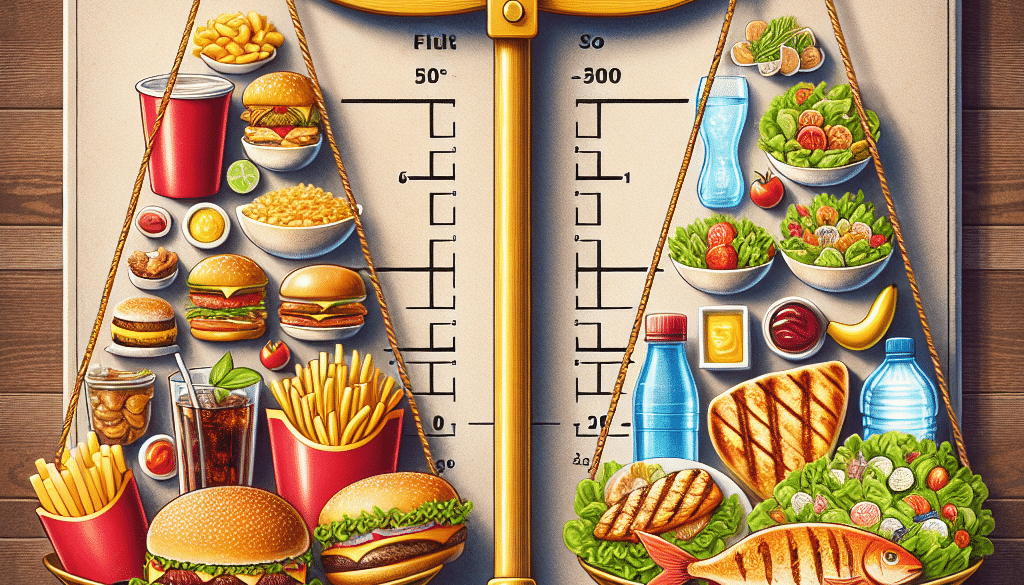Fast-food vs. Full-service Restaurant: Which is the Healthier Choice?
-
Table of Contents
- Fast-Food vs. Full-Service Restaurants: Evaluating Healthier Dining Options
- Understanding Fast-Food and Full-Service Restaurants
- Nutritional Content: Fast-Food vs. Full-Service
- Customization and Control Over What You Eat
- Case Studies and Examples
- Healthier Choices: Strategies for Dining Out
- Conclusion: Making an Informed Choice
- ETChem’s Protein Products: A Healthy Addition to Your Diet
Fast-Food vs. Full-Service Restaurants: Evaluating Healthier Dining Options
When it comes to dining out, consumers are often faced with a choice between fast-food and full-service restaurants. Each has its own set of advantages and disadvantages, particularly concerning health and nutrition. In this article, we will delve into the differences between these two dining experiences, examining which might be the healthier choice based on various factors.
Understanding Fast-Food and Full-Service Restaurants
Before comparing the health aspects of fast-food and full-service restaurants, it’s essential to define what each entails:
- Fast-Food Restaurants: These establishments are known for their quick service, convenience, and often lower prices. They typically offer a limited menu with items that are pre-prepared or quickly made to order.
- Full-Service Restaurants: These restaurants offer a more extensive menu with freshly prepared dishes. They provide table service and a more relaxed dining atmosphere, which usually comes with a higher price tag.
Nutritional Content: Fast-Food vs. Full-Service
When assessing the nutritional content of meals from fast-food versus full-service restaurants, several factors come into play:
- Caloric Intake: Studies have shown that meals from both types of restaurants tend to be high in calories. However, fast-food meals often have a higher calorie density due to larger portion sizes and the prevalence of fried foods.
- Nutrient Balance: Full-service restaurants may offer a wider variety of food groups, including fresh vegetables and lean proteins, which can lead to a more balanced meal. Fast-food options are frequently limited in terms of fresh produce and whole grains.
- Sodium and Fat Content: Both restaurant types often serve dishes high in sodium and unhealthy fats. However, fast-food establishments are particularly notorious for their excessive use of these ingredients to enhance flavor and preserve food.
Customization and Control Over What You Eat
One of the significant advantages of full-service restaurants is the ability to customize your meal. You can often request modifications to dishes, such as dressing on the side or grilled instead of fried proteins. This level of control is typically not available in fast-food settings, where meals are standardized and changes are limited.
Case Studies and Examples
Several studies have compared the health impacts of eating at fast-food versus full-service restaurants. For instance, a study published in the Journal of the Academy of Nutrition and Dietetics found that both restaurant types are associated with increased calorie intake. However, full-service restaurant meals were linked to higher intakes of healthy nutrients like potassium and omega-3 fatty acids.
Another study by the University of Illinois at Urbana-Champaign indicated that people who eat at full-service restaurants consume about 58 more calories on average than those who dine at fast-food outlets. However, the same study also noted that full-service restaurant meals tend to include more cholesterol and sodium.
Healthier Choices: Strategies for Dining Out
No matter where you choose to eat, there are strategies to make healthier choices:
- Portion Control: Be mindful of portion sizes, especially in fast-food restaurants where “super-sized” options are common.
- Ingredient Awareness: Look for menu items with fresh, whole ingredients and avoid those that are processed or contain trans fats.
- Balance Your Meal: Aim for a balance of macronutrients, including a good source of protein, healthy fats, and complex carbohydrates.
- Limit Add-Ons: Extras like sauces, dressings, and cheese can quickly add calories and unhealthy fats to your meal.
Conclusion: Making an Informed Choice
In conclusion, while both fast-food and full-service restaurants can present challenges to healthy eating, full-service establishments generally offer more opportunities for a balanced and nutritious meal. However, the ultimate responsibility lies with the consumer to make informed choices and request healthier options when dining out.
The key takeaways for healthier dining include being calorie-conscious, seeking nutrient balance, customizing meals when possible, and employing strategies to avoid overindulgence in unhealthy ingredients.
ETChem’s Protein Products: A Healthy Addition to Your Diet
For those looking to supplement their diet with high-quality protein, ETChem’s range of collagen products can be an excellent choice. Whether you’re dining at fast-food or full-service restaurants, incorporating ETChem’s protein into your meals or as a supplement can help ensure you’re getting the essential nutrients your body needs.
ETChem’s collagen products are sourced from various types, including marine, fish, bovine, and chicken collagen. These products are characterized by their neutral taste and instant solubility, making them easy to integrate into your diet. They are suitable for a wide range of applications, from sports nutrition to health and wellness products.
By choosing ETChem’s collagen, you’re opting for a product from a company trusted by leading global food and beverage brands and Fortune 500 companies. Enhance your diet with ETChem’s collagen and take a step towards healthier living, no matter where you choose to dine.
About ETChem:
ETChem, a reputable Chinese Collagen factory manufacturer and supplier, is renowned for producing, stocking, exporting, and delivering the highest quality collagens. They include marine collagen, fish collagen, bovine collagen, chicken collagen, type I collagen, type II collagen and type III collagen etc. Their offerings, characterized by a neutral taste, instant solubility attributes, cater to a diverse range of industries. They serve nutraceutical, pharmaceutical, cosmeceutical, veterinary, as well as food and beverage finished product distributors, traders, and manufacturers across Europe, USA, Canada, Australia, Thailand, Japan, Korea, Brazil, and Chile, among others.
ETChem specialization includes exporting and delivering tailor-made collagen powder and finished collagen nutritional supplements. Their extensive product range covers sectors like Food and Beverage, Sports Nutrition, Weight Management, Dietary Supplements, Health and Wellness Products, ensuring comprehensive solutions to meet all your protein needs.
As a trusted company by leading global food and beverage brands and Fortune 500 companies, ETChem reinforces China’s reputation in the global arena. For more information or to sample their products, please contact them and email karen(at)et-chem.com today.





